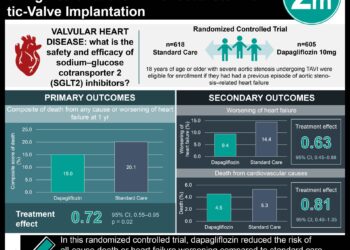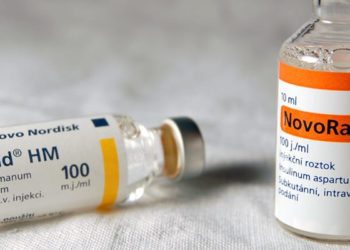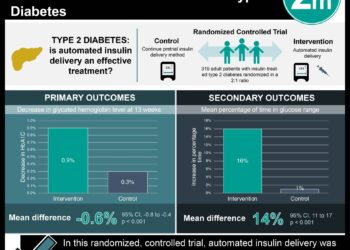Sodium-glucose cotransporter 2 inhibitors reduce heart failure hospitalization in type 2 diabetes patients
1. In patients with type 2 diabetes, sodium-glucose cotransporter 2 inhibitor (SGLT-2i) use was associated with reduced risk of composite heart failure and all-cause mortality as compared to metformin.
2. Those in the SGLT-2i group had an increased incidence of genital infections during one-year follow-up.
Evidence Rating Level: 1 (Excellent)
Study Rundown: Recent clinical trials have demonstrated that there are cardioprotective benefits associated with SGLT-2i use. Accordingly, emerging guidelines recommend SGLT-2i as a first-line treatment for patients with type 2 diabetes and comorbid cardiovascular disease. However, the majority of trials have only evaluated SGLT-2i as a second-line treatment for diabetic patients. The present population-based cohort study used data from three healthcare databases in the United States to compare one-year cardiovascular outcomes in patients with type 2 diabetes prescribed either SGLT-2i or metformin. SGLT-2i initiators had significantly lower rates of composite all-cause mortality and incidence of hospitalization due to heart failure than metformin initiators. There were no significant differences in rates of adverse cardiovascular events between groups. The safety profile was similar between SGLT-2i or metformin initiators, other than a higher incidence of genital infections in the SGLT-2i group. A limitation of this study was the reliance on observational data, which diminished the ability to control for diabetes severity and socioeconomic parameters. The data also lacked representation of racially diverse participants, limiting the generalizability of study findings.
Click to read the study in AIM
Relevant Reading: Association of SGLT2 Inhibitors With Cardiovascular and Kidney Outcomes in Patients With Type 2 Diabetes
In-Depth [retrospective cohort]: The present study used data from three healthcare databases to compare cardiovascular and safety outcomes in patients with type 2 diabetes who were initiated on either SGLT-2i or metformin. The study cohort consisted of 8,613 SGLT-2i initiators and 17,226 metformin initiators, with a mean follow-up time of 10.7 (median 6.6) and 12.2 (median 7.3) months, respectively. The incidence of composite and individual cardiovascular outcomes was compared between SGLT2i and metformin initiators. The incidence rates per 1000 person-years for composite myocardial infarction, stroke, and all-cause mortality in the SGLT-2i group and the metformin group were 15.0 and 16.2, respectively (hazard ratio [HR], 0.96; 95% confidence interval [CI], 0.77 to 1.19). For composite hospitalization due to heart failure and all-cause mortality, incidence rates per 1000 person-years for those in the SGLT-2i group versus the metformin group were 18.3 and 23.5 (HR, 0.80; 95% CI, 0.66 to 0.97). There was no significant difference between groups for rates of stroke and all-cause mortality. The safety analysis, which included acute kidney injury, diabetic ketoacidosis, bone fractures, severe hypoglycemia, severe urinary tract infection, and lower-limb amputation, demonstrated no significant differences between the two groups other than higher incidences of genital infections in the SGLT-2i initiators (HR, 2.19; 95% CI, 1.91 to 2.51). Overall, the present study demonstrated that SGLT-2i may have cardioprotective effects as a first-line treatment for type 2 diabetes.
Image: PD
©2022 2 Minute Medicine, Inc. All rights reserved. No works may be reproduced without expressed written consent from 2 Minute Medicine, Inc. Inquire about licensing here. No article should be construed as medical advice and is not intended as such by the authors or by 2 Minute Medicine, Inc.







![The ABCD2 score: Risk of stroke after Transient Ischemic Attack (TIA) [Classics Series]](https://www.2minutemedicine.com/wp-content/uploads/2013/05/web-cover-classics-with-logo-medicine-BW-small-jpg-75x75.jpg)